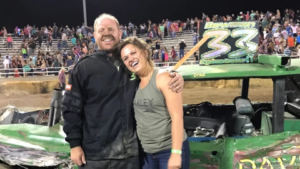Long before the Iowa Caucus, before Joe Biden beat Bernie Sanders and COVID-19 cancelled canvassing, before the Biden-Harris ticket was a twinkle in Democrats’ eye, LaTosha Brown and Cliff Albright were crisscrossing the country to talk to Black voters about what was bothering them.
Last year Brown and Albright, the co-founders of a group called Black Voters Matter, took more than 20 road trips across battleground states, driving hours in a giant vehicle they dubbed “the blackest bus in America.” They weren’t stumping for a particular candidate or political agenda. They were on a larger mission: to restore Black voters’ faith in a democracy that so often seems to disregard them. They spoke about becoming “trusted messengers,” and restoring “credibility” to American democracy.
In August 2019, I tagged along on one of their road trips across Michigan. Six people showed up in Grand Rapids. The Saginaw meeting was like a prayer session; the Benton Harbor event felt more like a civic forum. In Lansing, they met with a youth group where barely half the room was eligible to vote. They’d always start out by singing gospel and usually end with fried chicken, dance to a few songs by James Brown, then get back on the bus and be on their way.
Brown explained her reasoning as she leaned back on the bus’s leather seats: Black voters, she said, had come to think of the Democratic Party like “the friend you only hear from when they want something.”
I recalled this conversation a year later, as I revisited much of the same territory. Over the course of nearly four dozen interviews with Black voters this month, from Flint and Detroit, Mich., to Milwaukee and Kenosha, Wis., it was clear that when it comes to Black voters, Democrats aren’t just running against Donald Trump. They’re running against a deep mistrust of the system, born from Republican voter suppression and Democratic neglect.
Distrust was the undertone to nearly every conversation. Most voters I talked to said they planned to vote for Biden—not that they thought it would matter. Centuries of suppression made many voters doubt that their ballot would be counted; generations of political disappointment made others doubt that it would make any difference if it was. The persistence of systemic racism through the presidency of Barack Obama only deepened their disillusionment.
“We had Obama and nothing changed,” says Jamar Mayfield, a 37-year old production technician waiting outside to catch a glimpse of Biden on his visit to Kenosha on September 3. If the first Black president couldn’t improve things, who could?
Tandem Hubbard, a 46-year old health-care worker shopping in the soup aisle of a Walmart in North Milwaukee, said that she voted for Hillary Clinton in 2016 but that “this year I’m not even gonna waste my time.”
“They’re like used car salesmen. They’ll say anything to get you on their side,” Hubbard says, adding that her troubles getting food stamps and hazard pay make her even less likely to show up. “Why would I vote? I’m not getting any benefit for anything.”
This sentiment was particularly pronounced in Michigan, where Black voters often feel powerless on the local level yet have outsized power over the national outcome.
“Some of those people are lost forever,” says Kermit Williams, President of the Pontiac city council and executive director of Oakland Forward, a local grassroots group that partners with Black Voters Matter. “They really do believe that their vote does not count and they haven’t seen any change.”
Black voters in Michigan have ample reason to be skeptical. Over the past 20 years, cities with high Black populations—from Flint to Pontiac, and Benton Harbor to Detroit—have seen their elected officials usurped by state-appointed emergency managers in times of municipal crisis. These unelected emergency managers were responsible for switching Flint’s water source to save money, a move which contributed to the widespread lead poisoning of the mostly Black population. Black residents of these cities voted for their local elected officials, then the state came in and replaced them with unelected bureaucrats; no wonder they so often believe their votes don’t matter, because historically, they didn’t.
“Flint has been through the worst: crime, the water, now this,” says one Flint man named Aaron, referring to COVID-19. “I’m that close to not voting, because every time a President gets in, nothing changes.”
But the same voters who believe their votes don’t count on a municipal level actually have a tremendous amount of power in a presidential election. Small fluctuations in Black turnout in Michigan can tip the state, and with it the Electoral College. Democrats felt the sting of this disillusionment in 2016, when Black turnout dipped slightly as white non-college turnout increased, causing Donald Trump to win the state by barely 10,000 votes. According to an analysis by the liberal Center for American Progress, if Black turnout had stayed at 2012 levels, Clinton would have carried Michigan. Nationwide, Black turnout dipped seven points in 2016 according to Pew, the first drop in 20 years, which almost certainly contributed to Clinton’s loss.
So Black organizers are leaving nothing to chance. For the last four years, grassroots groups across the country have intensified efforts to engage Black voters in order to shore up the Democratic base. Some say that big donors and Democratic officials aren’t taking the task as seriously as they should, focusing on wooing white suburban voters away from Republicans rather than strengthening and protecting the Black voters at the core of their base.
“There is an enormous, Grand Canyon-sized gap between the rhetoric around the importance of Black voters and the organization,” says Nse Ufot, executive director of the New Georgia Project, which has registered hundreds of thousands of new voters in Georgia since 2014 as it fights voter suppression efforts in the state. “We’re not only stepping in where government agencies have failed, we’re also stepping in where campaigns have failed.”
Make sense of what matters in Washington. Sign up for the daily D.C. Brief newsletter.
In Michigan, the state party says it isn’t making that mistake. “We have been engaging in the Black community since right after the 2016 election,” says Democratic Party Chair Lavora Barnes. “We recognize that we should have started in the black community earlier.”
The state party’s efforts are clearly paying off. Democrats made big gains in the 2018 midterms, where Black turnout in Wayne County, home to Detroit, rose 16 points from 2014. In the Presidential primary in March, the Democrats saw a “turnout explosion,” Barnes said at the time, increasing turnout by nearly 30% over 2016 primary levels. In Detroit, which is 80% Black, the city clerk received more than 90,000 requests for absentee ballots ahead of this year’s Senate primary in August, the most in history.
Democrats are hoping that four years of grassroots, in-person organizing in Black communities will help lift Biden to victory in an election upended by the pandemic, which prompted both his campaign and the state Democratic party to suspend door-knocking and take field organizing online. “That sustained organizing is what’s led the Democratic party to still be able to maintain voter contacts and extend our reach even when the door-to-door canvassing got paused,” says Michigan. Lt. Gov. Garlin Gilchrist. “When you say every vote matters, that is literally true in Michigan.”
When Brown and Albright visited Michigan in 2019, the goal was to build a sustainable network of engagement that would transcend the election cycle. “People are going to flood the state in a couple of months because Michigan is a swing state,” Brown told me then, leaning back on the leather seats of the bus as MSNBC blared coverage of primary candidates like Pete Buttigieg and Andrew Yang. By the time the general election rolled around, she predicted, the opportunity to build real trust would have passed.
Then, of course, the coronavirus intervened. The pandemic halted the predicted flood of organizers and canvassers; instead, the Biden campaign and the Michigan Democratic Party are mounting an entirely digital operation, rooted in phone calls, texts, and online events rather than physical engagement. Heading into the final six weeks of the campaign, some organizers worry that the digital campaign will fail to reach some Black voters, particularly older people or those without reliable internet access.
“You’re not gonna reach the type of voters you need on Zoom,” says Branden Snyder, executive director of grassroots racial justice group Detroit Action. “They’re talking to people like me, when they should be talking to people like my mom.”
Organizers say that’s why voter engagement outside election cycles is so valuable. If they hadn’t been organizing consistently since 2017, Brown says, “we would be in a bind.” They would be trying to reach voters who had never heard from them before, asking for trust they hadn’t earned. Instead, the consistent, in-person organizing of Black voter engagement groups throughout 2017, 2018 and 2019 has given Democrats a parachute for 2020.
“Now, we can’t go door to door,” says Brown, “but we have relationship capital with people who have networks we can lean on.”
As Black communities suffer the brunt of the Covid-19 pandemic, grassroots voter engagement groups have morphed into social-service providers. Ufot says the New Georgia Project is donating hygiene essentials and perishable goods to a community devastated by both Covid-19 and hurricane season: “You will hear from New Georgia Project about whether or not your family needs Pampers, and whether or not you’ve received your absentee ballot yet,” she says. Oakland Forward, the local Michigan group run by Kermit Williams, is giving out food, masks and laundry detergent. “You can’t just talk to people about voting,” says Williams, “if their basic needs are not met.”
Unlike the Biden campaign or the Michigan Democratic Party, Oakland Forward has chosen to continue doing in-person organizing. With funding and encouragement from Black Voters Matter, the organization has knocked on more than 2,000 doors in the last three weeks, and is planning an outdoor, socially distanced voter-registration picnic, complete with a food truck. “We’re getting them engaged,” Williams says, “So that when we do get-out-the-vote in those same areas, they know us and we’re familiar.”
Between the years of effort and the obvious stakes of this election, some Black voters say they are more engaged than they were four years ago. Michael Willis, a 42-year old who works in public transportation, didn’t vote in 2016. “I felt like my vote wasn’t gonna matter,” he says, heading into a Sterling Heights, Mich., grocery wife with his wife, who rolled her eyes. But this year, he says, “I want to make sure I use my American right.” He’ll be voting for Biden.




